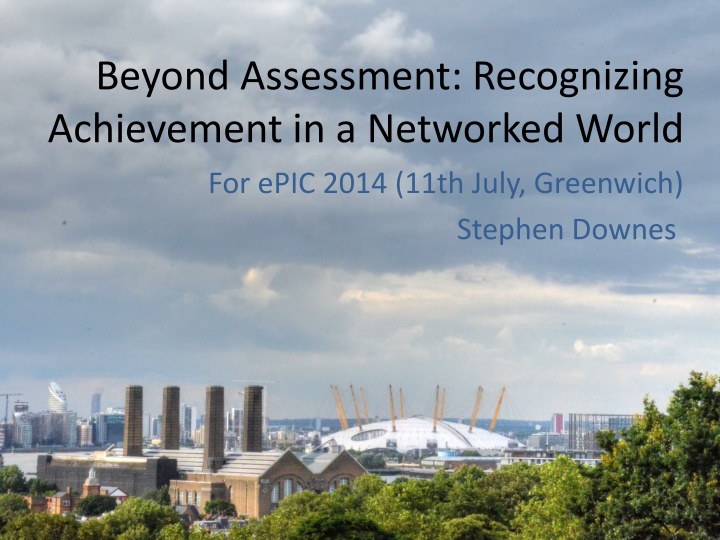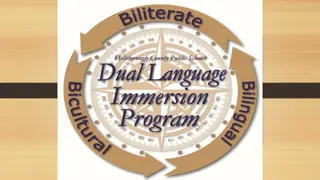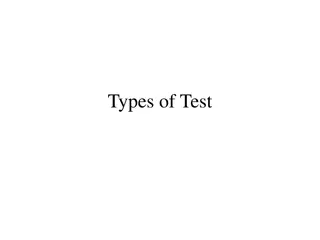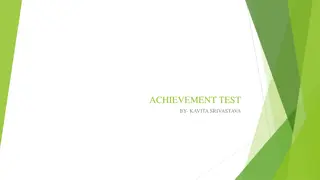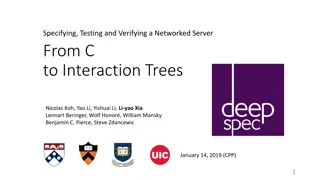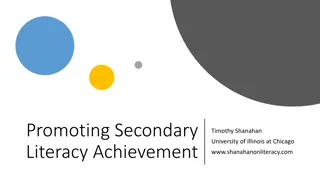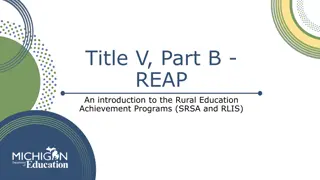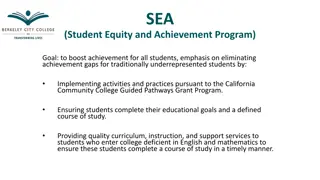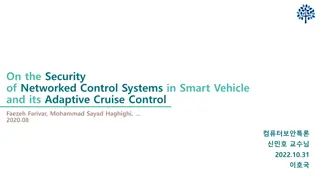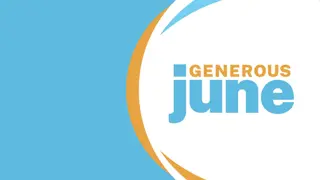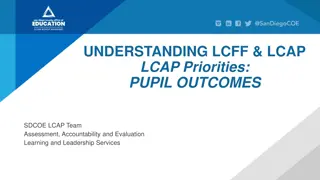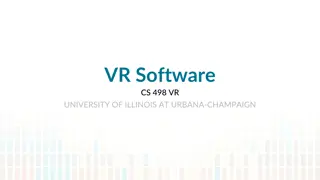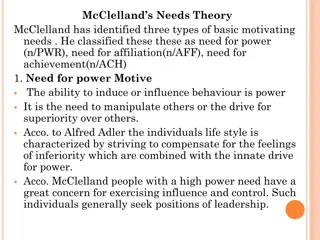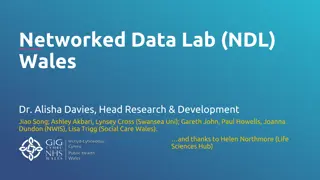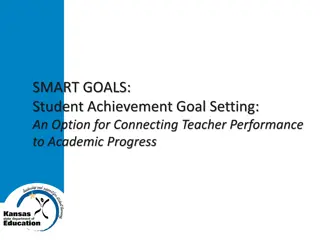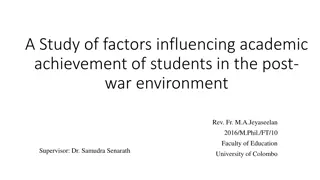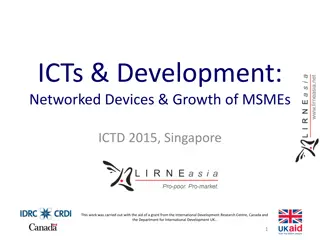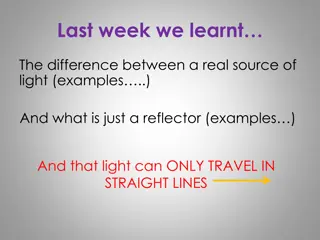Reflections on Achievement and Success in a Networked World
Explore the complexities of achievement and success in a networked world through discussions on cultural knowledge, academic success, job search challenges, personalized learning experiences, and ethical considerations of student data use. Dive into the nuances of recognition, education, and skills in the digital age.
Download Presentation

Please find below an Image/Link to download the presentation.
The content on the website is provided AS IS for your information and personal use only. It may not be sold, licensed, or shared on other websites without obtaining consent from the author.If you encounter any issues during the download, it is possible that the publisher has removed the file from their server.
You are allowed to download the files provided on this website for personal or commercial use, subject to the condition that they are used lawfully. All files are the property of their respective owners.
The content on the website is provided AS IS for your information and personal use only. It may not be sold, licensed, or shared on other websites without obtaining consent from the author.
E N D
Presentation Transcript
Beyond Assessment: Recognizing Achievement in a Networked World For ePIC 2014 (11th July, Greenwich) Stephen Downes
What does it take to be a Dean at MIT? "Ms. Jones had received the institute s highest honor for administrators, the M.I.T. Excellence Award for Leading Change. But no degree. http://www.nytimes.com/2007/04/27/us/27mit.html?_r=5&
Meanwhile, how many of us are just faking our cultural knowledge? And does it matter? Is there some set of core materials we should all know? http://www.cbc.ca/player/News/Canada/Audio/ID/2461862894/
It's interesting to think of culture as a type of language that makes it possible to communicate, but it's a mistake, I think, to confuse knowing a language, which is an extended facility (as in playing a game), with knowing a set of facts. Photo: http://www.essentiallifeskills.net/ludwig-wittgenstein-philosophy.html
What constitutes success? Success, say, as an academic researcher ? the number of articles the impact factor of the journals number of citations more than expected Really? http://chronicle.com/blogs/ticker/scientists-calculate-your-chances-of-success-in-academe/79063 Image: http://www.iihr.uiowa.edu/about/publications/recent-iihr-journal-publications/
Issues and questions 1. LinkedIn, job boards, and portfolio sites make it easier than ever to look for work. So why does it seem harder than ever to find a job? http://www.cbc.ca/spark/blog/2014/04/27/hr-tech/
2. Today's students leave lots of data trails - from demographic information, to how they read and highlight ebooks, and interact online. Is it ethical to use this? http://www.cbc.ca/spark/blog/2014/04/27/personal-education/
3. If everyone's learning experience is customized, does that mean everyone gets an A?
Are MOOCs doing what we need? Not according to traditional metrics [nonetheless] shifting the definition of education away from its historical roots to a skills-based, instrumentally-defined exercise. http://www.hybridpedagogy.com/journal/mooc-problem/
What is it we need? One way of looking at it is the skills gap Large swaths of those unemployed are not what employers are seeking...
Looked at this way, it would make sense for employers to offer learning and test for skills But that s not what s happening http://business.financialpost.com/2014/05/12/employers-must-start-investing-in-skills- training-or-risk-having-public-policy-nudge-them-along/
Whats being recommended instead Learning Outcomes Assessment Program Council on Skills and Higher Education Education and skills for Aboriginal peoples Narrow the skills gaps between men and women Credential recognition and skills training for immigrants http://canada2020.ca/wp- content/uploads/2014/05/2014_Canada2020_Pa per-Series_Education_FINAL.pdf
Doing it the hard way: compiling learning task inventories to define sets of activities related The largest impact seemed to be obtained when LTIs helped students determine what they did or did not know. http://celt.uwindsor.ca/ojs/leddy/index.php/CELT/article/view/3976 to skills
To solve old problems, click here So here basically is the basis for instructional design: Start with what you want them to learn, design an experience that will cause them to learn it, build in some checks that this is happening along the way and has happened by the end. http://www.oliverquinlan.com/blog/2014/06/11/theory-of-change-in-education/
Thats what PISA did But maybe PISA isn t working Their skills and qualities should also be acquired from a variety of activities such as play, online activities, and games instead of merely completing academic assignments or extending homework time. PISA http://zhaolearning.com/2014/05/25/not-interested-in-being-1-shanghai-may-ditch-pisa/ http://sh.sina.com.cn/news/k/2014-03-07/160084868.html
Why the emphasis on testing? One theory: it makes testing companies a lot of money the per-student cost for testing is currently around $31 per student, times 50 million students in the U.S. alone http://www.teachthought.com/learning/solving-the-problem-of-modern-assessment/
And yet education is crucial for development, and skills build on skills The average time spent in school by a country s students and the labour productivity of its workers have been statistically linked. - Pearson http://thelearningcurve.pearson.com/reports/the-learning-curve-report-2014
The problem with outcomes Useful outcomes, like understand and appreciate are vague and undefinable but concrete outcomes like display , recite and define are behaviourist and based in rote http://chronicle.com/blognetwork/castingoutnin es/2014/03/05/creating-learning-objectives- flipped-classroom-style/ http://www.spritzinc.com/
Gardner Campbell: these complexities matter. When confident, simple, plain, orderly advice is given about a complex matter, I hear the sound of the hatchet replaced by the sound of wood snapping as the branch I m sitting on gives way. http://www.gardnercampbell.net/blog1/?p=2239
The educational black box limits our options here Most all educational theory belongs either to the category of (a)continuing to use the black box, or (b)making stuff up that we think characterizes cognitive phenomena. http://www.hackeducation.com/2 014/06/07/what-should- technologists-know-about- education/ http://dangerouslyirrelevant.org/ 2014/06/ed-tech- behaviorism.html
This, for example, is a blatant appeal to made up stuff: our brains need some way of deciding what to encode and how to encode it, so as to retrieve it in a way which is useful. Our minds solve this problem by encoding information along with its affective context http://www.aconventional.com/2014/06/learning-explained.html
Talbot: Biologys shameful refusal to disown the machine-organism Even a simple concept like 'Paris' is more like a wave of interconnected neural activations, an activation that takes place in the very same body of water as the next wave http://natureinstitute.org/txt/st/org/comm/ar/2014/machines_18.htm Image: https://emedtravel.wordpress.com/page/16/
The next phase: competency-based education CBE models offer credentials based on demonstrated proficiencies Critics argue that it seems too much like training and is focused too much on outcomes http://www.universityaffairs.ca/competency-based-degree-programs-are-growing-in-the-us.aspx http://eduvation.ca/ideas/competency-based-degrees/ http://academica.ca/top-ten/competency-based-degrees-continue-gain-popularity
Personal learning requires competencies? Well, yes, under some circumstances: You can t truly do personalized learning and also continue to have common expectations without competencies. http://blogs.kqed.org/mindshift/2014/06/going-all-in-how-to-make-competency- based-learning-work/
There is no systematic, comprehensive study indicating that the purported skills from a CBE program translate into performance. But which competencies? We don t really know http://heqco.ca/SiteCollectionDocuments/CBE Report-ENG.pdf http://heqco.ca/en-CA/Research/Research Publications/Pages/Summary.aspx?link=139
What are we getting instead? A slew of alternative credentials A veritable slew! Qualt are based on courses developed by the Association of Accounting Technicians (AAT), Google, the Institute of Direct and Digital Marketing (IDM) and other professional bodies. http://www.qualt.com/
Everybodys in on it (Harvard s) response is to create a new type of credential, the Credential of Readiness, or CORe, which students can take online. http://www.nytimes.com/2014/06/01/business/business-school-disrupted.html?_r=0
ALT designs and releases badges as part of its ocTEL MOOC It also releases a plug-in Badges issued using BadgeOS are now exposed as Open Badges compliant Assertion https://newsletter.alt.ac.uk/2014/06/alt-issues-first-open-badges- as-part-of-octel-and-releases-plugin-to-the-community/ http://cogdogblog.com/2014/06/25/to-badge-yourself-or-to-be- badged/
Udacity: Together with AT&T and an initial funding from AT&T Aspire of more than $1.5 million, we are launching nanodegrees: compact, flexible, and job-focused credentials that are stackable throughout your career. http://blog.udacity.com/2014/06/announcing-nanodegrees-new-type-of.html
European Commission: VM Pass (Recognition of virtual mobility and OER learning) validation process that is based on combination of peer review and crowdsourcing. http://acreelman.blogspot.ca/2014/06/passport-for-learning.html http://vmpass.eu/
College Credentials by Cond Nast Writers and editors will contribute subject matter expertise The publisher will provide some financial backing to the partnerships http://www.insidehighered.com/news/2014/06/03/conde-nast-team-venture-fund- create-college-courses-credentials
open access to machine-readable representations of learning objectives published by education agencies and organizations including the Common Core State Standards. http://www.achievementstandards.org/
Learning Locker open source Learning Record Store (LRS) for tracking learning data turnkey offering, the Cloud LRS http://www.ht2.co.uk/ben/?tag=learning-locker http://learninglocker.net/
The Holy Grail of open learning at the moment is finding a sustainable and reliable model for the validation of non-traditional learning. -- Alastair Creelman But this makes me ask: do we want to validate the learning, or the person? http://acreelman.blogspot.ca/2014/06/passport-for-learning.html
Lets remember what the objective was Jobs, Skills, Gap http://flowingdata.com/2014/07/02/jobs-charted-by-state-and-salary/
A basic understanding of understanding: I don't really think the answer to "do you understand?" is "let me demonstrate". It s too easy to fake. But there s a sense in which knowing is about doing rather than some mental state http://www.academia.edu/611581/On_Maturana_and_Varelas_Aphori sm_of_Knowing_Being_and_Doing_A_Phenomenological- Complexity_Circulation
To know is to recognize Recognition isn't a mental state, like a belief or an idea. It is a physical state - quite literally, the organization of connections - which is manifest as a disposition - the propensity to respond appropriately in an authentic environment
To do, in other words, rather than to know. Theories and concepts can help associate different perceptual states and make us better recognizers. But they are an aid to learning, not the objective. http://www.daveswhiteboard.com/archives/5265
The secret formula to becoming an e- learning professional (or anything else, for that matter) e-learning pros practice their craft e-learning pros show examples of their work e-learning pros share what they do and learn http://www.articulate.com/rapid-elearning/secret-formula-becoming-e-learning-pro/
Heres me showing what I know Here's my LinkedIn network showing a lot of connections in Latin America, the UK and India http://www.bethkanter.org/catechfestla/ https://www.facebook.com/photo.php?fbid=10151498446276256&set=pb.51394 6255.-2207520000.1379085355.&type=3&theater
Add life-logging to learning A system called SCROLL (System for Capturing and Reusing of Learning Log). This in turn is based on the LORE model: Log, Organize, Reuse, Evaluate. http://www.ifets.info/journa ls/17_2/8.pdf
Add learning to the Internet of Everything "We will have to get skilled at constantly lumping data and things together, then filtering and categorizing the changing landscape." http://www.jarche.com/2014/06/mastering-the-internet-of-everything/
Its assessment based on public performance, like an essay (and can be assessed in the same way an essay can be assessed) And I know there are sceptics about machine-graded essays, but they re wrong http://chronicle.com/article/Writing-Instructor-Skeptical/146211/ http://vikparuchuri.com/blog/on-the-automated-scoring-of-essays/
The machines are fooling you with as much as 65 percent of online chatter being generated by bots, chances are you've read or interacted with one. http://www.bbc.com/future/story/20140609-how-online-bots-are-tricking-you
Grading is a recognition task This is what neural networks do It s how we design and build interfaces for ourselves It s how we ll interact with the internet of things http://architectures.danlockton.co.uk/2014/04/21/i ntroducing-powerchord-blackbird-edition/
Its how were beginning to understand the world now (it s sometimes depicted as intuitive but it s a language, it s a culture, and we re growing up with it) That s what Tapscott really means (though he might not know it) http://www.youtube.com/wa tch?v=E5umSdiizH0
Were beginning to become sensitive to these cues and signals we send over the internet 'Can I Tweet That?' http://www.insidehighered.com/news/2014/06/13/aaup-conference-sessions-focus-academic- freedom-relation-social-media Image: http://www.brucesallan.com/2013/05/24/social-media-social-good-social-media-mistakes/
We reveal ourselves in our messages, and others reveals their thoughts about us in theirs 'She will mock your aspirations then cackle over the remains of your spirit.' 'Good lecturer, ugly shoes.' http://www.insidehighered.com/news/2014/06/27/amusing-video-has-professors-read-aloud- harsh-student-reviews Image: http://www.entrepreneurs-journey.com/796/how-to-make-millions-selling-ugly-shoes/
These assessments can be devastatingly personal and uninhibited Discourse online is much less inhibited than discourse in person. http://www.networkedlearningconference.org.uk/abstracts/pdf/rose.pdf Image: http://nyrm.org/?p=76
Well see it in other areas first Use Big Data, crush the numbers in specialized AI software, and soon the narrative of why and how mental health issues appear, of why some students persist and some not, will become clear, predictable and operational. http://www.universityaffairs.ca/how-artificial-intelligence-is-about-to-disrupt- higher-education.aspx
